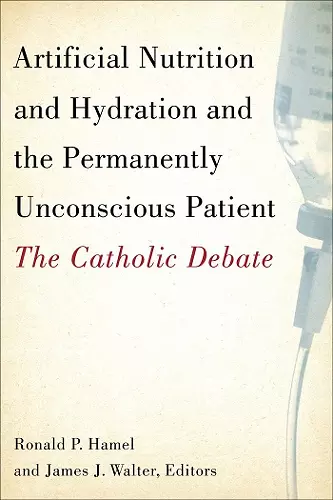Artificial Nutrition and Hydration and the Permanently Unconscious Patient
The Catholic Debate
Ronald P Hamel editor James J Walter editor
Format:Paperback
Publisher:Georgetown University Press
Published:13th Sep '07
Currently unavailable, and unfortunately no date known when it will be back

Rather than argue for a simplistic and one sided solution to the problem at hand, Hamel and Walter offer an exemplary moral study guided by an appropriately theological methodology. They provide the relevant Church texts which frame the issue and present a legitimate range of theologians-gratefully, often new voices to the conversation-who responsibly engage and critically appropriate the tradition. -- Thomas Kopfensteiner, Catholic Health Initiatives
Presents twenty-one essays and articles that reflect the spectrum of perspectives on the issues that define the Catholic debate. Suitable for students and scholars, this volume invites theological dialogue and ethical discussion on one of the most contested issues in the church.During the past few decades, high-profile cases like that of Terry Schiavo have fueled the public debate over forgoing or withdrawing artificial nutrition and hydration from patients in a persistent vegetative state (PVS). These cases, whether involving adults or young children, have forced many to begin thinking in a measured and careful way about the moral legitimacy of allowing patients to die. Can families forgo or withdraw artificial hydration and nutrition from their loved ones when no hope of recovery seems possible? Many Catholics know that Catholic moral theology has formulated a well-developed and well-reasoned position on this and other end-of-life issues, one that distinguishes between "ordinary" and "extraordinary" treatment. But recent events have caused uncertainty and confusion and even acrimony among the faithful. In his 2004 allocution, Pope John Paul II proposed that artificial nutrition and hydration is a form of basic care, thus suggesting that the provision of such care to patients neurologically incapable of feeding themselves should be considered a moral obligation. The pope's address, which seemed to have offered a new development to decades of Catholic health care ethics, sparked a contentious debate among the faithful over how best to treat permanently unconscious patients within the tenets of Catholic morality. In this comprehensive and balanced volume, Ronald Hamel and James Walter present twenty-one essays and articles, contributed by physicians, clergy, theologians, and ethicists, to reflect the spectrum of perspectives on the issues that define the Catholic debate. Organized into six parts, each with its own introduction, the essays offer clinical information on PVS and feeding tubes; discussions on the Catholic moral tradition and how it might be changing; ecclesiastical and pastoral statements on forgoing or withdrawing nutrition and hydration; theological and ethical analyses on the issue; commentary on Pope John Paul II's 2004 allocution; and the theological commentary, court decisions, and public policy resulting from the Clarence Herbert and Claire Conroy legal cases. A valuable resource for students and scholars, this teachable volume invites theological dialogue and ethical discussion on one of the most contested issues in the church today.
In an age when multiculturalism and respect for the sources of ethical understanding is urged, Artificial Nutrition and Hydration and the Permanently Unconscious Patient provides readers a scholarly opportunity to experience the method of Catholic theology in facing ethical questions in medicine ... [Recommended] for those on ethics committees, physicians, and other caregivers who can take time to read some of the challenging material and to all persons who desire insight into how religious traditions consider critical issues in medical care. JAMA (Journal of the American Medical Association) Hamel and Walter have done a significant service by providing the reader with the medical, legal, theological, and magisterial materials necessary to formulate a position on the significance of the prudential teaching offered in John Paul II's 2004 allocution and the CDF response to the American bishops on the obligation to use artificial nutrition and hydration to prolong life. Theological Studies This is an essential book for any library that aspires to maintain a decent bioethics section. It contains a substantial collection of essay and official teaching documents that seek to present and develop Roman Catholic teaching on the care of patients who are permanently unconscious ... In one book ... the student is given a comprehensive and up-to-date series of reflections on one of the most controversial bioethical issues. Theological Book Review This book will be valuable to anyone working in medicine or medical ethics. And since it is my practice to respect my patients' religious beliefs, I think the book is absolutely necessary. Journal of Palliative Medicine A welcome and valuable collection of essays which should be widely used by experts, graduate students, and anyone wishing to become better informed on the status quaestionis of this particular end-of-life health care debate. Catholic Books Review Provides an unbiased and well-balanced account of the various isses invloved in the use of ANH with PVS patients from a Catholic perspective. It is highly recommended for those working with PVS patients in the hospital, long term care, community settings and anyone wanting to challenge their beliefs on the matter. Provinical Health Ethics Network
ISBN: 9781589011786
Dimensions: unknown
Weight: 408g
304 pages